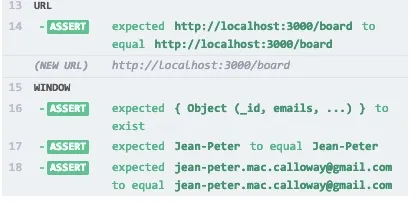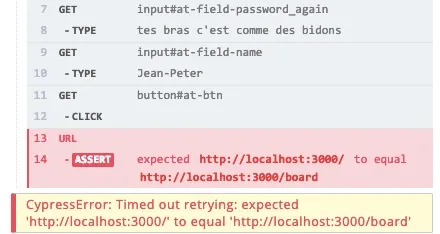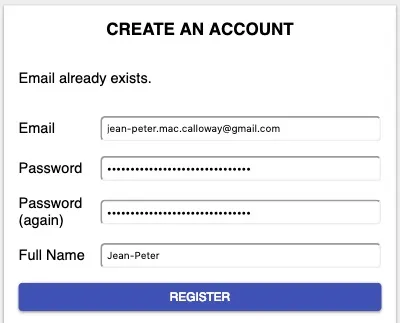
First-class End-to-end Testing on Meteor

I’ve been a big fan of meteor since its beginnings. Since the graphql trend, it has been kind of forgotten and I wanted to check if it was still awesome. Spoiler: I think it is.
A toy project came to my mind and it was the right fit to give meteor a try again: it needed reactive data. Prototyping is still very fast and the developer experience is awesome, it makes everything a breeze. Except when you want end-to-end (e2e) tests, just like for my toy project.
The last time I’ve used e2e tests was with selenium, through protractor. And to be honest, it was a real nightmare. Since then, I saw my colleagues use cypress and it seemed a lot better, I got really jealous not to have the occasion to use it.
Here was the challenge: setup first-class e2e testing on the meteor app.
Install Cypress
I followed a simple tutorial to set up cypress on meteor.
Quick version:
- Install cypress with yarn
meteor yarn add -D cypress- Move cypress tests outside of the folders meteor compiles
mv cypress/ tests/cypress- Adapt the
cypress.jsonconfiguration to meteor
{ "fixturesFolder": "tests/cypress/fixtures", "integrationFolder": "tests/cypress/integration", "pluginsFile": "tests/cypress/plugins/index.js", "screenshotsFolder": "tests/cypress/screenshots", "supportFile": "tests/cypress/support/index.js", "videosFolder": "tests/cypress/videos", "baseUrl": "http://localhost:3000"}- Run tests
// package.json"scripts": { "test": "cypress open"},meteor yarn testCreate the First Test
Let’s create the first test to assert that cypress works. First, remove all the example tests cypress comes with:
rm -Rf tests/cypress/integration/examplesThen, test if users can register:
describe("sign-up", () => { beforeEach(() => { cy.visit("http://localhost:3000/"); });
it("should create and log the new user", () => { cy.contains("Register").click(); cy.get("input#at-field-email").type("jean-peter.mac.calloway@gmail.com"); cy.get("input#at-field-password").type("awesome-password"); cy.get("input#at-field-password_again").type("awesome-password"); // I added a name field on meteor user accounts system cy.get("input#at-field-name").type("Jean-Peter"); cy.get("button#at-btn").click();
cy.url().should("eq", "http://localhost:3000/board");
cy.window().then((win) => { // this allows accessing the window object within the browser const user = win.Meteor.user(); expect(user).to.exist; expect(user.profile.name).to.equal("Jean-Peter"); expect(user.emails[0].address).to.equal( "jean-peter.mac.calloway@gmail.com", ); }); });});If everything went fine, the test should pass.

You still have to launch meteor manually (meteor run), and run test on another terminal (meteor yarn test). I would like everything to happen automagically with a single command so that I can integrate it into a continuous integration server without too much hassle.
Run and Stop Meteor Automagically
At first, I thought a script like the following one would be enough:
meteor &meteor yarn testkillall meteorBut as you can guess, meteor takes some time to boot up and isn’t ready when the tests start.
I then stumbled upon a github repository integrating meteor and cypress with circle CI, using start-server-and-test.
As its name suggests, this package starts the server, and launches the tests; except that it waits until a specified address is available before starting the tests.
- Install
start-server-and-test
meteor yarn add -D start-server-and-test- Adapt
package.json
"scripts": { "start-server": "meteor", "cypress:open": "cypress open", "test": "start-server-and-test start-server http://localhost:3000 cypress:open",},- Run it
meteor yarn test- It should display this kind of output
yarn run v1.13.0$ start-server-and-test start-server http://localhost:3000 cypress:openstarting server using command "npm run start-server"and when url "http://localhost:3000" is respondingrunning tests using command "cypress:open"
> toy-project@ start-server /toy-project-path> meteor
[[[[[ ~/Projects/toy-project ]]]]]
=> Started proxy.=> Started MongoDB=> Started your app.
=> App running at: http://localhost:3000/
> toy-project@ cypress:open /toy-project-path> cypress openCypress effectively launches only when meteor is ready.
Run Tests on a Production Build
Tests are supposed to be as close to production as possible to detect defects earlier. It would be a lot better to test the meteor production build output instead of just the development mode.
Meteor has us covered with the --production flag.
Add the flag to the package.json script:
"scripts": { "start-server": "meteor --production", "cypress:open": "cypress open", "test": "start-server-and-test start-server http://localhost:3000 cypress:open",},- Don’t worry about the “testing purpose” warning it gives, we’re actually testing, it’s a valid use case:
Warning: The --production flag should only be used to simulate production bundling for testingpurposes. Use meteor build to create a bundle for production deployment.See: https://guide.meteor.com/deployment.html- Build with the
--productionflag is much slower, you might want to trigger those builds only on the CI, and not on your development machine.
Be Able to Reset Database Between Tests
Everything seems to work fine, but when launching the tests for the second time, they don’t pass:

And since the cypress GUI is awesome, I can see the the error I got and inspect the page at this stage:

Indeed, the user has already been created the last time the tests ran, and the database didn’t change in-between. Since meteor recreates any missing database or collection, the easiest way is to just drop the whole database every time it’s needed.
Cypress has us covered on that part, with custom commands:
- Create a custom command that drops the database
Cypress.Commands.add("resetDatabase", () => cy.exec('mongo mongodb://localhost:3001/meteor --eval "db.dropDatabase()"'),);- Use it anywhere it’s needed
describe('sign-up', () => { before(() => { cy.resetDatabase(); }); //...If you find dropping the whole database too rough, you can add a cypress command taking the path to a file containing mongodb queries, something like:
Cypress.Commands.add("executeDatabaseScript", (filePath) => cy.exec(`mongo mongodb://localhost:3001/meteor ${filePath}`),);Have a Dedicated Database
Since everything ran perfectly, I went back to writing code. I launched the app but couldn’t log in anymore, that’s when I realized that the tests had dropped the development database.

Indeed, tests need to run on their own database. But I would like to keep the meteor internal database because it’s actually very handy, the CI already has meteor, and I don’t want to bother using docker-compose.
I thought that starting tests with MONGO_URL=mongodb://localhost:3001/test would be enough. Actually, meteor doesn’t launch its internal mongo instance when you give it a MONGO_URL. Fair enough, but then how to “change” the database name?
We actually need to launch a whole new instance of meteor. To do so, meteor has an undocumented (only appears on 1.3.3 changelog) env var METEOR_LOCAL_DIR which specifies the directory from which meteor launches everything. By default, this value is .meteor/local, but if changed to .meteor/test, the test instance will be completely isolated from the development instance, including the database.
It happens in the package.json:
"scripts": { "start-server": "METEOR_LOCAL_DIR=.meteor/test meteor --production", "cypress:open": "cypress open", "test": "start-server-and-test start-server http://localhost:3000 cypress:open",},Do Not Launch Cypress GUI on CI
While Cypress GUI is very handy when writing tests, launching them on a CI requires to run all tests headlessly. Makefile is a very good tool for that:
- Add a new script on
package.json
"scripts": { "start-server": "METEOR_LOCAL_DIR=.meteor/test meteor --production", "cypress:run": "cypress run --browser chrome", "cypress:open": "cypress open", "test": "start-server-and-test start-server http://localhost:3000 cypress:open", "ci": "start-server-and-test start-server http://localhost:3000 cypress:run"},- Use a makefile target
test: ## Launch testsifeq ($(CI),true) meteor yarn cielse meteor yarn testendif- Launch tests
# On development machinemake test
# On CICI=true make testConclusion
Meteor still provides a really awesome experience.
What I liked the most back then is still there: An all-inclusive build tool, free reactive data, free optimistic rendering, code sharing between the client and the server, all-inclusive authentication packages…
What I liked less: Templates rendering with Blaze and meteor package management. They could both be replaced by better known alternatives like React and yarn.
The only thing that’s not included is a full-featured e2e tests framework. The documentation is scarce, the meteor build tool is not very flexible, and I really struggled setting up cypress. But it works, and cypress is the ideal fit for meteor, it shares the same values of making the developers’ lifes easier.
With this tutorial, you can now set up top-notch e2e testing with cypress without the hassle of setting up anything else than meteor on your CI server. No more excuse for building an app without e2e tests!
Authors

Facilitator at marmelab, Florian also gives lectures to IT students. He's a biker, plays the guitar, and brews his own beer.